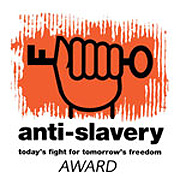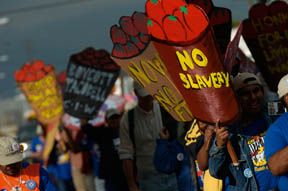
News comes as timely reminder of the unconscionable state of agricultural labor relations in Florida’s Fields as the March on Burger King fast approaches…
From the Anti-Slavery International website:
“Anti-Slavery International is delighted to announce that the winner of the 2007 Anti-Slavery Award is the Coalition of Immokalee Workers (CIW) for their exceptional contribution towards tackling modern-day slavery in the United States agricultural industry.
The CIW is a worker-led community organisation based in Florida, which works with farm workers trafficked into forced labour, the majority of whom are from Mexico and Central America. They uncover and investigate cases of slavery whilst raising awareness of forced labour practises amongst the farm worker community. Their determined efforts have resulted in the prosecution of six slavery cases in the past decade and the liberation of over a thousand workers held in debt bondage. The CIW also seeks to prevent forced labour within the industry and has successfully campaigned for corporate buyers to take responsibility for the conditions in their supply chain, leading to historic agreements with the largest fast-food corporations in the world.”
Others who have won the award in the past include the Bonded Liberation Front of India, Harry Wu for his fight against Chinese prison camps, and Pureza Lopes Loiola for her work campaigning against the use of slave labor on Brazil’s rural estates. It is a tremendous honor to be included in the same list as these distinguished defenders of human rights. The award is particularly significant this year, as is comes on the 200th anniversary of Britain’s abolition of the transatlantic slave trade. You can read more on the award at the ASI website by clicking on the links below:
- Forced labor in the US agricultural industry
- About the Coalition of Immokalee Workers
- Press release announcing the award
For the past decade, stories of modern-day slavery have come out of Florida’s fields with an alarming regularity. The CIW — with members in tomato fields and citrus groves across the state — has helped lead the efforts to document and bring these cases to justice.
To anyone who cared to notice, the need for significant labor reform in the Florida agricultural industry was undeniable. Local newspapers ran in-depth investigative series — with titles like “Modern-day Slavery: Still Harvesting Shame,” (Palm Beach Post, 12/03) and “Fields of Desperation: Destitute Farmworkers Exploited,” (Miami Herald, 9/03) — provoked by the steady drumbeat of slavery operations discovered in the state. The national media also traveled to Florida to investigate the disturbing revelations of abuse, with articles in The New Yorker (“Nobodies: Does Slavery Exist in America?” 4/03) and National Geographic (“21st Century Slaves,” 10/03). And most recently, a new book — entitled “Nobodies: Modern American Slave Labor and the Dark Side of the New Global Economy” by John Bowe — published this year, takes an even closer look at the phenomenon of slavery in agriculture.
Yet, still today there are “leaders” of Florida’s agricultural industry who stubbornly deny that there is any problem in their fields. They call the Florida employers jailed year after year for holding their workers against their will “a few bad apples.” And they refuse to admit that the unconscionable state of farm labor relations that is the norm in Florida — sub-poverty wages, no right to overtime, no right to organize, and no benefits, conditions that can only be called “sweatshop” conditions — is the fertile ground that gives rise to extreme cases of exploitation such as slavery.
 Worse yet, those agricultural industry leaders are encouraged in their intransigence by the major buyers of Florida produce — companies like Burger King — that continue to buy millions and millions of pounds of tomatoes, oranges, and peppers no questions asked.
Worse yet, those agricultural industry leaders are encouraged in their intransigence by the major buyers of Florida produce — companies like Burger King — that continue to buy millions and millions of pounds of tomatoes, oranges, and peppers no questions asked.
Thanks to the Campaign for Fair Food, however, that is beginning to change, and corporations at the top of the food industry are beginning to demand changes in the fields where their produce is planted and picked. Indeed, today, in the wake of the Yum Brands and McDonald’s agreements, we stand on the threshold of a more modern, more humane agricultural industry in Florida.
Yet, facing this historic opportunity, Burger King seems to have chosen business as usual over progress, continued exploitation over justice. It is time for Burger King to seize the moment and stand with Florida’s tomato pickers in our fight for fundamental human rights in the fields.
Join us this November 30th in Miami as we march on Burger King’s corporate headquarters and take the next step in moving Burger King out of the way of progress and behind the principles of the Campaign for Fair Food.
Meanwhile, check out these stories on the award from Southwest Florida papers:
- Naples Daily News, “Immokalee farmworkers’ work receives international recognition” (11/14/07)
- Ft. Myers News Press, “Coalition honored for war on slavery” (11/13/07)
